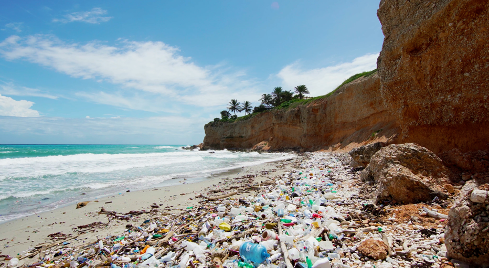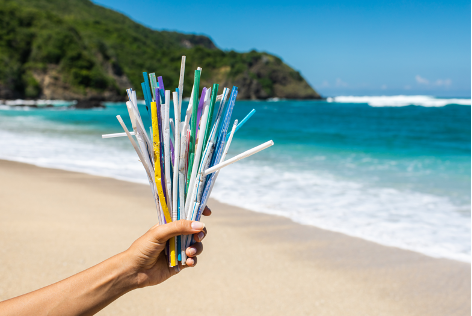Reasons, Roadmaps & Rewards for Banning Plastic & Protecting Our Environment
By Carmen Greger

As the Nation relentlessly sweeps its littered streets, there’s a new eco-trend sweeping the Nation.
Plastic has gotten a bad ‘wrap’, and rightfully so. Plastic bags, plastic bottles, plastic utensils and plastic straws…. just some of the wasteful components that make up an actual island of plastic (truly one of five major earth-threatening, climate changing plastic islands) that lies between California and Hawaii, also known as the Great Pacific Garbage Patch, according to the most recent Google search is now ‘three times the size of France and is the world’s biggest ocean waste repository, with 1.8 billion pieces of floating plastic which kills thousands of marine animals each year.’
Eco-consciousness is growing among many, although still hasn’t caught on for some who turn a deaf ear at being reminded of the effects of being irresponsible with their non-reusable, non-recyclable waste products directly attached to their personal consumption. Those who understand the negative impact and who have been willing to stand up mindfully and be positive change makers, have collectively made a big impact, but the time is now for everyone, locally, regionally, nationally, globally personally and professionally to get on board the ship before there are too many plastic islands that clutter and toxify our oceans.
“Plastics now pollute all dimensions of our ocean from the sea surface to the seafloor, on remote beaches and in Arctic Sea ice. The impact ocean plastics have on marine species is well documented, but increasingly scientists are concerned about the potential threat of plastics to species at the top of the marine food chain: humans”, says Vice President of Conservation, Ocean Plastics, Ocean Conservancy (OceanConservancy.org).
According to Plastic Collectors (PlasticCollectors.com), ‘Plastic materials are non-biodegradable. As a result, they are the highest contributors to the pollution of soil, water and air. A plastic-free environment is a necessity to the modern world to sustain future generations.’
And Almost Zero Waste (AlmostZeroWaste.com) adds that ‘reducing the use of plastic is essential because plastic production requires an enormous amount of energy and resources. This causes carbon emissions and contributes to global warming. Recycling plastic is inefficient- only 9% of plastic ever produced has been recycled. Instead, about 60% is discarded in landfills and oceans. There it stays for thousands of years, transforming into ‘microplastic’ leaching into our water supplies and food’.
Oceans and landfills are not a place for plastic, and exporting it is a trashy and unviable option all together. Solution? Produce and use less plastic. And hopefully eliminate it altogether. Much to the delight of many, a plastic bag ban initiative has been recently launched, embraced and practiced by a growing number of states and individuals, and will hopefully spark the acceptance and support of a nationwide single-use plastics ban.
Where there are problems, there are usually bright ambitions individuals, groups and corporations to collectively engage and collaborate in order to fix them. Stemming from the seed of awareness, acknowledgement and need for action, and matched with capability, responsibility and resourcefulness, many have come together and pooled resources to create groups to teach both awareness and alternatives.
Such change agents have started specific missions that zoom in on the issues and begin to solve them, knowing and standing beside the concept of ‘if you’re not part of the solution, then you’re a part of the problem.’

In 2020, a very well-known company, Starbucks, announced a ‘planet-positive’ commitment including its mission to eliminate plastic straws (which have a significantly lower recyclability rate than most other forms of plastic), introduce sippy lids and cups made of polypropylene, which contain significantly less and more readily recyclable plastic (although it is still debated as to how much of that material actually does get recycled due to contamination concerns and other, but its progress, a step in the right direction, and fixing the issues we’ve all created is a process and as new facts roll out and deeper awareness grows, adjustments must be made accordingly and quickly so) and market metal reusable straws and others made of a variety of alternate sustainable materials in their stores. Compostable cups may potentially soon make their debut and next up on the agenda is a commitment to ‘shifting away from. single-use to reusable packaging’. Putting their money where their mouth is, they have proactively engaged in launching, researching and educating on sustainability with programs such as the ASU-Starbucks Center for the Future of People and the Planet and Starbucks Global Academy. Big companies need to take big action. Starbucks stands that ‘We are committed to becoming resource positive- to give more than we take from the planet. We will store more carbon than we emit, eliminate waste and conserve and replenish more freshwater than we use. (Starbucks.com)
What can you do?
- Lead by example. Embrace reusable and biodegradable products and mindfully share with your family, friends, coworkers and community about your commitment, the benefits and the movement.
- Be honest. Don’t pretend that one person’s waste doesn’t matter. Collectively, as we’ve seen, it becomes islands.
- Stay educated and aware of the current issues facing our planet’s well-being.
- Vote with your dollars.
- Bring your own reusable bag to the market. Give one to a friend and encourage them to do the same.
- Pack a glass or other reusable water bottle with you daily. Use glass food storage containers rather than those of the plastic variety.
- Do not use plastic, or at least greatly reduce your use of it over time and notice the results.
- Use bamboo, paper or agave straws or the new sip-lids that big companies like Starbucks offer.
- Shop at stores and from companies aligned with a healthy planet and renewable resources and have well established sustainability practices, not just sales and inconvenient, wasteful convenience.
- Donate to a local, national or global earth friendly program.
Eartheasy.com lists 11 great earth friendly programs to check out:
- USC Union of Concerned Scientists
- NRDC Natural Resources Defense Council
- EWG Environmental Working Group
- Greenpeace Fund
- Friends of the Earth
- Rainforest Alliance
- Earthjustice
- Ocean Conservancy
- E.I.I. Earth Island Institute
- The Sierra Club Foundation
- LivingLandsandwaters.org
We are all in this together. We all have an impact, whether positive or negative, on our environment, our air quality, our oceans, our planet and the existence, survival and quality of life of all inhabitants here-within. Even if you are already a mindful steward of the Earth and its creatures, perhaps do a little more, go beyond your comfort zone just a touch, and inspire others to do the same. If you are not one who pays much attention to the containers of plastic you use and mounds of waste you create by doing so, then choose again and be proud of yourself for protecting and respecting your Home.
We respectfully invite you to try for one week to eliminate all plastic in your life.
We’ll be cheering for you! And we would really love to hear about your experience!
This is a new column focused on addressing the need for eco-awareness and inspired action.








